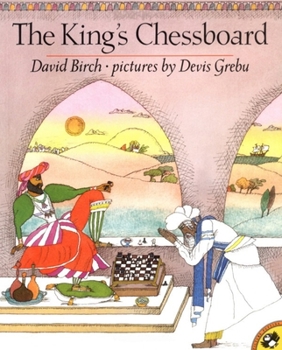The King's Chessboard (Picture Puffins)
Select Format
Select Condition 
Book Overview
"Masterfully told."- School Library Journal A great story for children learning mathematical concepts, The King's Chessboard tells the story of a wise man who refuses the king's reward for completing a favor. When the king insists the man accept a reward, the man proposes a deal- He will take a payment of rice equal to each square on the king's chessboard-doubling the amount he receives with each day. This quickly empties out the royal coffers. . . . A Notable Children's Trade Book in the Field of Social Studies and Outstanding Science Trade Book for Children
Format:Paperback
Language:English
ISBN:0140548807
ISBN13:9780140548808
Release Date:July 1993
Publisher:Puffin Books
Length:32 Pages
Weight:0.50 lbs.
Dimensions:0.1" x 8.5" x 10.5"
Age Range:3 years and under
Grade Range:Preschool
Related Subjects
Children's Children's Books Family Life Geography & Cultures Literature & Fiction Royalty ValuesCustomer Reviews
5 ratings
A great teaching tool in many ways
Published by Thriftbooks.com User , 17 years ago
My students loved the mathematical concepts in the book, and were especially intrigued by the size of the numbers that were eventually involved. It is also a great companion piece to One Grain of Rice, by Demi, which is a different retelling of the same Indian folk tale. The slightly different moral, and the differing characters, make for a good exercise in comparison and contrast.
Wonderful!
Published by Thriftbooks.com User , 18 years ago
I facilitate a Game Theory and Multicultural Math workshop for ages 9-12 and used this book during our study of the Tower of Hanoi. This book offered a wonderful way to open the discussion of exponential possibility. The illustrations and story are capturing and make the concept of exponents easy to grasp. Further, it takes place in India which was perfect for the math around the world teme. Loved it!
"Rice Anyone?"
Published by Thriftbooks.com User , 19 years ago
Have you ever paid the price for being a little too nice? "The King's Chessboard" was about a proud king in Deccan, India who paid the price for rewarding a wise man that didn't want to be rewarded. The King asked the wise man what would his reward be. The wise man said serving the King was his reward, but the King insisted on rewarding the servant. So, the wise man asked for one grain of rice. Then, each day for 64 days the wise man would recieve twice as much than the day before for each square on his chessboard. Things soon got out of hand because they were now giving the wise man tons of rice. By the end of the period they would have given out 274,877,906,944 tons of rice. The King had to stop the wise man from recieving these huge amounts of rice. In the end, the king would learn how easy it is for pride to make a fool of someone, even a king.
Outstanding book
Published by Thriftbooks.com User , 20 years ago
My 7 year old, mathematically gifted son loves this story. First of all, he loves chess; and secondly, he loves numbers (and the related concepts) even more. Thus this book has the best of both worlds for him. The most important lesson here, IMHO, is the book teaches that pride can get in the way of good judgement. The story also teaches the important concept of one-to-one relationships (ie, functions) with numbers. Any math teacher will tell you, it's not the numbers per se that are important, but the relationships and interactions that are important. Lastly, the story illustrates the math concept of geometric progression, how after a few turns, little number 'explode' into big ones. Overall, excellent story that teaches both social values and mathematical concepts.
Problem Solving with Children's Literature
Published by Thriftbooks.com User , 27 years ago
This book is an excellent resource for elementary teachers to use with math problem solving. Students can use the chess board and rice to solve the problem in the book. Students can measure an ounce of rice and figure how much rice is in a pound. Using this literature in a math class will motivate and enhance learning. I highly recommend it for educators.





